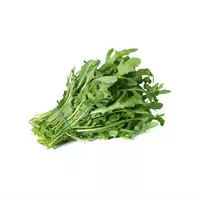Arugula

Rucola, arugula or rucolla? For a long time, this issue was considered insoluble until all-knowing philologists came to the rescue. They solved this dispute very simply, recognizing all options as correct and permissible. In addition to these, rukola has many folk names: caterpillar, reveller, etc.
In Russia, this spicy grass has long been considered a weed, but gradually the fame of it, as an unusually tasty and useful green, allowed the rukola to claim a worthy place on our table. It has been known since ancient times, it was grown back in the Roman Empire, where it was considered the most powerful aphrodisiac.
In today's world, rukola is becoming more and more popular. The Italians were the first to appreciate her taste. And currently, rukola is used in the cooking of many countries in a wide variety of dishes: in salads, in the first dishes, rukola is added to side dishes, pizza, sauces are made from it. They eat rukola and fresh. To preserve the useful properties, the roucol is not advised to cut, but is recommended to tear with your hands.
The Benefits of Rukola
This green is unusually popular among models and is vied with by nutritionists as a remarkably useful and effective weight loss tool. The calorie content of the hand is 25 kcal. 100 gr. , While it is perfectly saturated due to the generous content of fiber. In addition, there are a huge amount of vitamins C, A, B, E, K and trace elements of potassium, calcium, magnesium, iron and iodine in the composition of the curcola. All this allows us to talk about the undoubted benefits of rukola for human health.
In particular, it perfectly affects the digestive and nervous systems. When eating rukola, there is an increase in the body's resistance to various infections, a decrease in blood sugar and, on the contrary, an increase in hemoglobin.
In folk medicine, the useful properties of rukola are widely known. The juice of this plant is actively used to get rid of freckles, hematomas, calluses and nasal polyps. Strikingly, Rukola has a preventive effect on the development of cancer tumors, to treat even long-standing ulcers, advanced forms of gastritis. Vitamin A is known as a substance that exclusively positively affects the condition of the skin, hair and nails. But this is unusually important for women, and in combination with the dietary purpose of this green, it makes rukola a real friend of the beautiful half of humanity.
But men shouldn't ignore the truly magical spicy weed either. The benefits of rukola are also noted for male health. Rukola serves as one of the main components of the so-called "passion drink, " so the ancient people who considered rukola a natural aphrodisiac were right. Once again, this proves the endless wisdom of our ancestors, wisdom that cannot be ignored.
Rukola harms
Rukola can cause severe allergic reactions as a plant rich in phytoncides. Also, the harm of rukola can manifest itself in people suffering from gastritis with increased acidity, liver and kidney diseases. Experts do not recommend including rukola in the diet of pregnant women and breastfeeding mothers, as rukola can provoke undesirable consequences for the child.
Rukol 25 kKal
Energy value of rucoles (Ratio of proteins, fats, carbohydrates - ju):
Proteins: 2.58 g (~ 10 kCal)
Fats: 0.66 g (~ 6 kCal)
Carbohydrates: 2.05g (~ 8kCal)
Energy ratio (bj | y): 41% | 24% | 33%
 Español
Español Français
Français Português
Português Русский
Русский 简体中文
简体中文 繁體中文
繁體中文 日本語
日本語 한국어
한국어 العربية
العربية Türkçe
Türkçe Қазақ
Қазақ Deutsch
Deutsch Italiano
Italiano Українська
Українська
